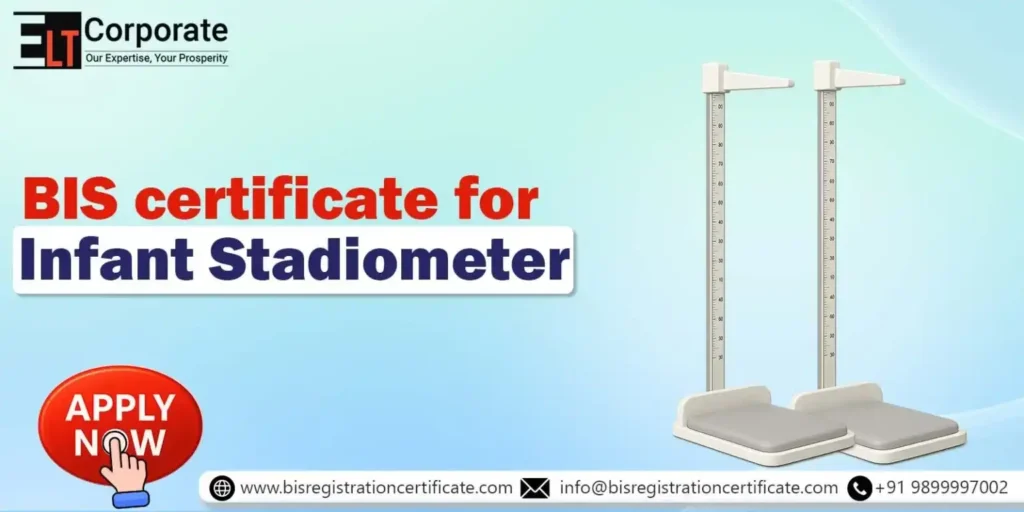Infant healthcare products serve as essential tools to track developmental progress in children. The Infant Stadiometer which serves to measure an infant’s length or height needs to comply with rigorous quality standards to maintain both accuracy and safety. A wide array of products in India become subject to the Bureau of Indian Standards (BIS) mandatory certification regime. This article presents an exhaustive exploration of BIS certification for Infant Stadiometers covering its significance, applicable standards, registration procedure, required documentation, and common inquiries.
What is an Infant Stadiometer?
An Infant Stadiometer is a medical device designed to measure the recumbent length (from head to toe) of infants and young children. It consists of a horizontal measuring board or base and a head and foot sliding component to ensure precise measurement.
Due to the critical nature of growth monitoring in infants, the device must be highly accurate, durable, and free from harmful materials. This makes regulatory certification essential.
What is BIS Certification?
India’s national standards institution, known as the Bureau of Indian Standards (BIS) functions under the governance of the Ministry of Consumer Affairs, Food & Public Distribution. The BIS certification process serves as a quality assurance system that verifies product compliance with Indian Standards for safety, performance, and reliability. Products specified within Quality Control Orders (QCOs) require mandatory BIS certification. The realm of infant milk substitutes demands critical attention to consumer health and safety standards.
Read More: Introduction To Bureau Of Indian Standards
Why is BIS Certification for Infant Stadiometers required?
The Bureau of Indian Standards (BIS) is a national body responsible for standardisation, quality assurance, and certification in India. BIS certification:
- Ensures product safety and performance
- Protects infant users from inferior quality products
- Creates trust among healthcare professionals and consumers
- Is mandatory if the product is listed under QCO (Quality Control Order)
As of 2024, many infant and healthcare measurement devices, including Infant Stadiometers, are being brought under mandatory BIS certification by the Department for Promotion of Industry and Internal Trade (DPIIT) through various QCOs.
Applicable Indian Standard for Infant Stadiometer
The BIS certificate is granted based on Indian Standards (IS). For Infant Stadiometers, the applicable standard is:
IS 17582: 2021 – Infantometer (Stadiometer)
This standard specifies requirements related to:
- Design and dimensions
- Material used
- Accuracy of measurement
- Marking and labeling
- Performance testing
The manufacturer must ensure that their product complies with all the technical and safety criteria prescribed under IS 17582: 2021.
Types of BIS Certification Schemes
Depending on whether the product is manufactured in India or imported, the BIS offers different certification schemes:
| Manufacturer Location | Certification Scheme | Mode of Certification |
|---|---|---|
| Indian Manufacturer | ISI Mark Scheme (Scheme I) | Product Certification with factory audit |
| Foreign Manufacturer | FMCS (Foreign Manufacturers Certification Scheme) | Product Certification for overseas manufacturers |
Step-by-Step Process For BIS Certification for Infant Stadiometer (ISI Mark Scheme)
Below, we mentioned Step-by-Step Process to obtain BIS Certificate for Infant Stadiometer:
- Check Standard Applicability
Confirm that your stadiometer falls under IS 17582: 2021 and whether it’s notified under a QCO. - Application Filing (Form-V)
Submit your application on the Manakonline portal along with necessary factory and product details. - Product Testing
Send samples to a BIS-recognised lab for testing as per IS 17582: 2021. Testing includes:- Dimensional accuracy
- Material qualitybis
- Safety compliance
- Factory Audit (for Indian manufacturers)
BIS officials will visit the manufacturing site to verify production capability, quality control, and testing facilities. - Scrutiny and Grant of License
Based on successful test results and audit, BIS issues a license to use the ISI Mark on the product. - Marking Requirements
The ISI mark must be displayed on the product and packaging, along with the license number and standard reference.
BIS Certification Process for Foreign Manufacturers (FMCS)
If you are a foreign manufacturer, the process involves:
- Appointment of an Authorised Indian Representative (AIR)
- Submission of Form VI under FMCS
- Product testing in India
- Audit by BIS official (factory visit)
- Signing of agreement and license grant
Foreign applicants must also pay additional fees for international travel, logistics, and security deposits.
Read More: Process for getting BIS for Certification
Documents Required for BIS Certification of Infant Stadiometer
Below we mentioned required documents for BIS Certificate of Infant Stadiometer:
| Document Type | Description |
|---|---|
| Factory Registration Certificate | Legal proof of business registration |
| ISO 9001 Certificate | (If available) for quality management systems |
| Product Technical Details | Design specs, components used, materials, diagrams |
| Test Report | From BIS-recognized lab as per IS 9639 |
| Internal Quality Assurance Plan | Details of manufacturing controls |
| Authorization Letter | If applying through an agent or AIR |
| Factory Audit Checklist | Filled as per BIS norms |
| Label/Packaging Artwork | Showing the intended ISI mark placement |
Read More: Documents Required For BIS Registration
BIS Certification Fees (Approximate)
| Fee Component | Amount (INR) |
|---|---|
| Application Fee | ₹1,000 |
| Sample Testing Charges | ₹10,000 – ₹25,000 (depending on lab) |
| Annual License Fee | ₹1,000 + taxes |
| Marking Fee (Per Unit) | Based on product category |
| Audit Charges | ₹7,000 – ₹15,000 |
Foreign manufacturers may incur additional costs for AIR, logistics, and security deposit (up to USD 10,000).
Penalty for Non-Compliance
If Infant Stadiometers are notified under mandatory BIS certification and a manufacturer sells non-certified units, they may face:
- Seizure of products
- Heavy fines under BIS Act, 2016
- Business license cancellation
- Prosecution and imprisonment
Quality Control and Testing Requirements
BIS requires manufacturers to implement continuous quality control (CQC) mechanisms, which may include:
- Regular testing of finished goods
- Calibration of measuring components
- Internal quality audits
- Retention of test records and batch tracking
Who Needs BIS Certification for Infant Stadiometer?
The following entities must apply forBIS Certificate for Infant Stadiometer:
- Indian manufacturers producing stadiometers for hospitals or clinics
- OEMs supplying to healthcare chains or government schemes
- Importers bringing finished units to India (under FMCS)
- E-commerce sellers or brands offering stadiometers online
ELT Corporate: Your Compliance Partner
As one of India’s leading regulatory consultancy firms, ELT Corporate offers dedicated support for BIS certificate for Infant Milk Substitute. Our strengths include:
- Experienced Team: Regulatory experts with years of experience in BIS processes
- Pan-India Presence: Strong working relationships with BIS officials and test labs across India
- Quick Turnaround: Fast-track approvals and minimal lead times
- Transparent Communication: Timely updates, guidance, and documentation support
Conclusion
The BIS certificate for Infant Stadiometer is a crucial regulatory requirement ensuring that measurement devices for infants meet the highest safety and quality standards. Whether you are a local manufacturer or an international brand, BIS compliance under IS 17582: 2021 is vital for market entry, regulatory approval, and consumer trust. As the Indian government intensifies enforcement through QCOs, obtaining BIS certification is no longer optional—it’s a legal necessity.
Is BIS certification mandatory for all infant stadiometers?
If stadiometers are notified under a QCO (which is likely given their medical use), certification becomes mandatory.
Can I sell imported stadiometers in India without a BIS certificate?
No, if the product is under mandatory certification, you must obtain a BIS license under FMCS.
How long does the BIS certification process take?
Typically, 4–6 weeks for Indian manufacturers and 6–9 months for foreign manufacturers due to factory audits.
Can one license cover multiple models?
No. Each distinct model or variant requires separate testing and possibly a separate license, unless they are functionally identical.
What is the validity of a BIS license?
A BIS license is valid for 1 year initially, and can be renewed for up to 5 years








